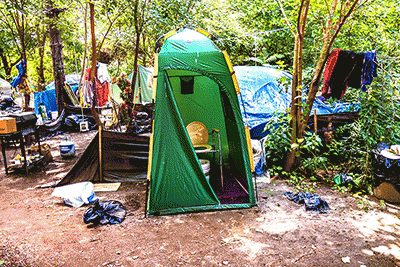Indoctrinated for decades by relativism, we're supposed to consider all life styles equal and never pass judgements. There must be legitimate reasons for a culture to embrace, for example, child marriage, bride kidnapping, female circumcision, Oprah Winfrey or universal, all day long access to pornography.
sh*t, though, is a hard sell, thus open sewers or public defecation don't have too many fans. In An Area of Darkness (1964), however, V.S. Naipaul describes one, "Indians were a poetic people, he said. He himself always sought the open because he was a poet, a lover of Nature, which was the matter of his Urdu verses; and nothing was as poetic as squatting on a river bank at dawn." The subject is a young, handsome and elegantly dressed Muslim student at "a laughable institute of education."
With such an attitude not rare, apparently, Naipaul found "Indians defecating everywhere, on floors, in urinals for men (as a result of yogic contortions that can only be conjectured). Fearing contamination, they squat rather than sit, and every lavatory cubicle carries marks of their misses. No one notices."
I learnt 35 years ago that a lavatory must be as clean as a drawing-room. I learnt this in the West. I believe that many rules about cleanliness in lavatories are observed more scrupulously in the West than in the East. There are some defects in their rules in this matter, which can be easily remedied. The cause of many of our diseases is the condition of our lavatories and our bad habit of disposing of excreta anywhere and everywhere.
In 2007, poet Vivek Narayanan wrote me from India:
The rows of shitters I pass on my morning run by the sea here in Madras (yes, not far at all from the very same marina where once Naipaul ogled, unflinching, a certain G-string) are all surly men, some with little cigarettes or joints hanging from their mouths.
I understand well the happiness and relief they must feel in being able to take their morning shits right by the waves, facing the rising sun--although I don't enjoy coming back from the run with the inevitable bits of human excreta sticking to my shoe.
The West itself has come a long way in regard to cleanliness. In The Road to Wigan Pier (1935), George Orwell talks about the undeniable stench of poor Englishmen:
Of course, as a whole, they are dirtier than the upper classes. They are bound to be, considering the circumstances in which they live, for even at this late date less than half the houses in England have bathrooms. Besides, the habit of washing yourself all over every day is a very recent one in Europe ["] But the English are growing visibly cleaner, and we may hope that in a hundred years they will be almost as clean as the Japanese.
Always paying attention to details, Orwell describes one working class arrangement:
The lavatories are in the yard at the back, so that if you live on the side facing the street, to get to the lavatory or the dust-bin you have to go out of the front door and walk round the end of the block--a distance that may be as much as two hundred yards; if you live at the back, on the other hand, your outlook is on to a row of lavatories.
Imagine having to routinely run the length of two football fields just to take a dump! So 83 years ago, most Englishmen had no toilet in their home, just like contemporary India, and Orwell gave them a century to be nearly as clean as the Japanese.
Spoiled by modern plumbing and sewerage, most Americans would find Jonathan Swift's "A Description of a City Shower" hardly believable:
Now from all parts the swelling kennels flow,
And bear their trophies with them as they go:
Filth of all hues and odors seem to tell
What street they sailed from, by their sight and smell.
They, as each torrent drives with rapid force,
From Smithfield or St. Pulchre's shape their course,
And in huge confluence joined at Snow Hill ridge,
Fall from the conduit prone to Holborn Bridge.
Sweepings from butchers' stalls, dung, guts, and blood,
Drowned puppies, stinking sprats, all drenched in mud,
Dead cats, and turnip tops, come tumbling down the flood.
(Note: You can view every article as one long page if you sign up as an Advocate Member, or higher).






